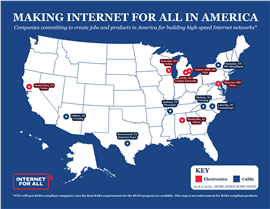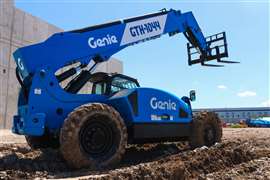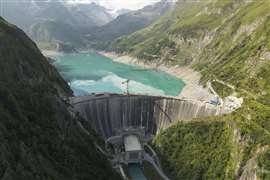Read this article in Français Deutsch Italiano Português Español
Specific ‘Buy America’ regulations waived for broadband construction
01 March 2024
The US National Telecommunications and Information Administration (NTIA) introduced a waiver earlier this month that loosens restrictions on foreign-made equipment on American broadband jobs.
 US companies, and their location, that manufacture broadband components and equipment for the country’s internet expansion. (Image: NTIA)
US companies, and their location, that manufacture broadband components and equipment for the country’s internet expansion. (Image: NTIA)
Following a petition for change by four US-based construction associations to the Biden administration’s ‘made in America’ requirements, the NTIA – an agency of the US Department of Commerce (DOC) has responded with some relief as foreign parts and equipment will now be allowed on certain broadband projects.
The trade associations –Associated General Contractors, American Road & Transportation Builders Association, American Public Transportation Association, and National Association of Home Builders – stated that their members were having “significant difficulty” navigating implementation of the Build America, Buy America Act by the Office of Management and Budget (OMB).
The US Congress passed the Build America, Buy America Act (BABA) in 2021 as part of the Infrastructure Investment and Jobs Act (IIJA). The BABA establishes domestic content procurements preference requirements for Federal financial assistance projects for infrastructure. It applies to all iron or steel products, manufactured products, and construction materials used for infrastructure projects under Federal Financial assistance programmes.
“DOC has determined that certain manufactured products and construction materials are not produced in the United States in sufficient and reasonably available quantities to meet the needs of the Broadband Equity, Access, and Deployment (BEAD) Program,” stated the notice of final waiver.
“DOC, therefore, is issuing a limited, general applicability, nonavailability waiver of the Buy America preference requirements for certain construction materials and certain manufactured products as applied to recipients of Federal financial assistance under the BEAD program.”
Specifically, materials waived included electronics (sans exceptions for optical line terminals, network terminals and network units) and non-optic-glass inputs (like an overclad cylinder), which is used to manufacture optical fibre and fibre optic cable.
The BEAD program established US$42.45 billion in allocated funds for deploying broadband service to ‘unserved locations’ and ‘underserved locations.’
Waiver does not include China-made components
While the waiver will allow contractors some flexibility, additional restrictions remain for China-made components. However, specific waivers to navigate that regulation also exist.
“BEAD Program funds may not be used to purchase or support ‘fibre optic cable and optical transmission equipment manufactured in the People’s Republic of China,’” stated the DOC, which added the exceptions can be made if “the eligible entity that awards a subgrant for the project shows that such application would unreasonably increase the cost of the project.”
While the allowance of outside materials will expand, NTIA’s senior policy advisor, Will Arbuckle, wrote that the agency still expects a high percentage of equipment and components to come from within the US.
“When we released the proposed BABA waiver in August [2023], we estimated that our approach would mean close to 90% of BEAD funds spent on equipment would be spent on equipment manufactured in the US,” he said. “Under the waiver released [February 2024], that estimate holds steady.”
STAY CONNECTED


Receive the information you need when you need it through our world-leading magazines, newsletters and daily briefings.
CONNECT WITH THE TEAM











